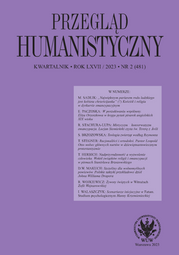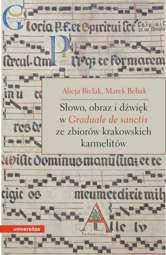Informacje o publikacji
| Wydanie: | 1 |
| Miejsce i rok wydania: | Warszawa 2023 |
| Język publikacji: | polski |
| ISBN/ISSN: | 2657-599X |
| Liczba stron: | 146 |
| Sposób publikacji: | PDF |
| Wielkość pliku: | 7,36 MB |
| Typ publikacji: | Praca naukowa |
Numer został poświęcony relacjom pomiędzy przemianami religijności a szeroko rozumianymi procesami emancypacyjnymi ujętymi w polskim piśmiennictwie drugiej połowy XIX wieku.
Poszczególne artykuły przedstawiają, jak różnorodne formy duchowości (te instytucjonalne i prywatne) wpływały na opisywanie grup nieuprzywilejowanych w obrębie społeczeństwa nowoczesnego. Autorzy i autorki kolejnych studiów przekonują, że religijność w znacznym stopniu oddziaływała na dziewiętnastowieczne narracje o wyzwoleniu i opresji, rozwoju i podporządkowaniu, że uwarunkowała ona unikalną dynamikę polskiej modernizacji – niekiedy jako czynnik hamujący, kiedy indziej napędowy. Osoby piszące w tomie podważają więc i komplikują tezę sekularyzacyjną, głoszącą, że wraz z postępem naukowo-technicznym doszło w XIX wieku do „odczarowania świata”.
W numerze znalazły się artykuły, które stanowią pokłosie ogólnopolskiej konferencji naukowej Dusze zmodernizowane. Religijność a emancypacja w piśmiennictwie polskim (1869-1914), zorganizowanej przez Zakład Literatury i Kultury Drugiej Połowy XIX Wieku UW w dniach 7-8 marca 2022 roku.
******
The issue is devoted to the relationship between the transformations of religiosity and broadly understood emancipation processes as captured in Polish writing of the second half of the 19th century. The individual articles show how various forms of spirituality (those institutional and private) influenced the description of underprivileged groups within modern society. The authors of the studies argue that religiosity significantly influenced nineteenth-century narratives of liberation and oppression, development and subjugation, and that it conditioned the unique dynamics of Polish modernisation – sometimes as an inhibiting factor, at other times as a driving one. The contributors to the volume thus challenge and complicate the secularisation thesis, which proclaims that with scientific and technological progress a 'disenchantment of the world' took place in the 19th century.
The issue includes articles that are the aftermath of the national academic conference "Modernized souls. Religiousness and emancipation in Polish writing (1869-1914)”, organised by the Department of Literature and Culture of the Second Half of the Nineteenth Century of the University of Warsaw on 7-8 March 2022.
Poszczególne artykuły przedstawiają, jak różnorodne formy duchowości (te instytucjonalne i prywatne) wpływały na opisywanie grup nieuprzywilejowanych w obrębie społeczeństwa nowoczesnego. Autorzy i autorki kolejnych studiów przekonują, że religijność w znacznym stopniu oddziaływała na dziewiętnastowieczne narracje o wyzwoleniu i opresji, rozwoju i podporządkowaniu, że uwarunkowała ona unikalną dynamikę polskiej modernizacji – niekiedy jako czynnik hamujący, kiedy indziej napędowy. Osoby piszące w tomie podważają więc i komplikują tezę sekularyzacyjną, głoszącą, że wraz z postępem naukowo-technicznym doszło w XIX wieku do „odczarowania świata”.
W numerze znalazły się artykuły, które stanowią pokłosie ogólnopolskiej konferencji naukowej Dusze zmodernizowane. Religijność a emancypacja w piśmiennictwie polskim (1869-1914), zorganizowanej przez Zakład Literatury i Kultury Drugiej Połowy XIX Wieku UW w dniach 7-8 marca 2022 roku.
******
The issue is devoted to the relationship between the transformations of religiosity and broadly understood emancipation processes as captured in Polish writing of the second half of the 19th century. The individual articles show how various forms of spirituality (those institutional and private) influenced the description of underprivileged groups within modern society. The authors of the studies argue that religiosity significantly influenced nineteenth-century narratives of liberation and oppression, development and subjugation, and that it conditioned the unique dynamics of Polish modernisation – sometimes as an inhibiting factor, at other times as a driving one. The contributors to the volume thus challenge and complicate the secularisation thesis, which proclaims that with scientific and technological progress a 'disenchantment of the world' took place in the 19th century.
The issue includes articles that are the aftermath of the national academic conference "Modernized souls. Religiousness and emancipation in Polish writing (1869-1914)”, organised by the Department of Literature and Culture of the Second Half of the Nineteenth Century of the University of Warsaw on 7-8 March 2022.
Zobacz również

Update Required
To play the media you will need to either update your browser to a recent version or update your Flash plugin.



























